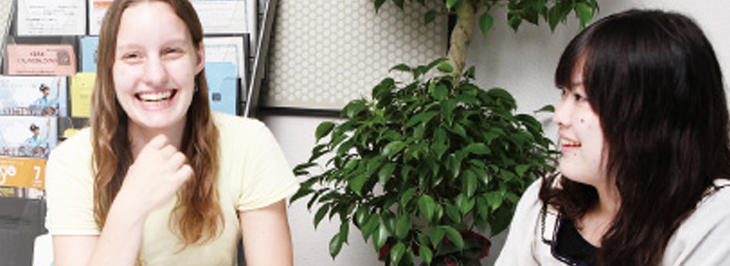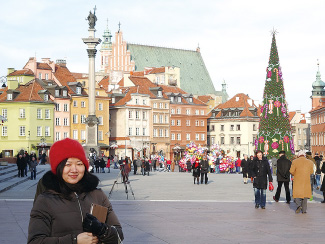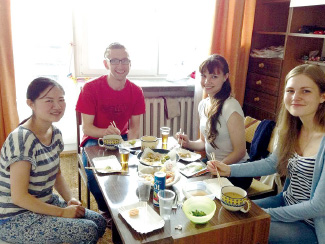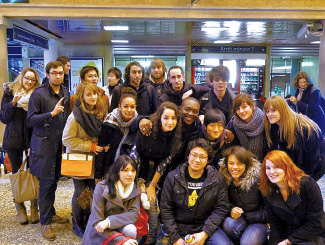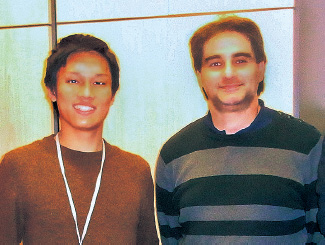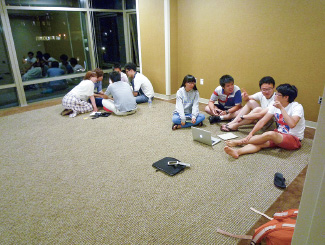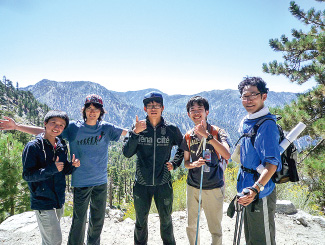Studying Abroad Report
Experiencing Affluent Ways of Life in Poland Where Most People Are Extremely Religious
2nd year Master Course in Educational Practices, Graduate School of Education Ms. Rinko Sueyoshi
Ms. Rinko Sueyoshi studied at The University of Warsaw in Poland, for one year from June 2013, as an exchange student. In a country where approx. 88% (*) of the population are Roman Catholic, she spent her time there searching for the meaning of religious education in Japan.
|
Standing in the crowded square in front of the Palace during the Christmas season, the winter air was cold but the sun was shining down making the colorful buildings look prettier. |
Ms. Sueyoshi is good at English but struggled with Polish. She tried to communicate with Polish friends by giving them Japanese paper or a fan as a gift, or cooking Japanese dishes such as Tempura for them. |
It was while advancing my studies on religious education that I made a new friend and decided to study abroad. When I was a tutor for an overseas student studying at Kumamoto University, encountering her faith inspired me to go abroad and experience religious people’s ways of living and thinking. I applied for an exchange at The University of Warsaw as one of the affiliated schools for student exchange with Kumamoto University and spent a year living in Poland, one of the most religious countries in Europe. The capital city, Warsaw is a devout Roman Catholic city where the good old days’ customs still remain, for example when a bus passes by a church, the passengers make the sign of the cross. Religion and the discipline to broaden humanity exist as a way to connect people, or as an axis in life. My stay in Poland helped me see the Japanese culture and the national character in a new light, which gave me a great opportunity to think of freedom without religion and its harmful effects. I am currently working on a master’s thesis discussing the meaning of religious education in Japan and the issues surrounding it. How should we deal with religion in educational institutions in a country where many people do not have a specific religion? I am seeking the best answer to this question by utilizing my experience of studying in Poland. Before I studied in Poland, I thought it was a big challenge to leave Japan. However, once I was abroad I understood the significance of studying abroad. The experience broadened my range of choices for the future. I used to want to be an English teacher, but I now like to think of my future, looking outside of Japan with flexible ideas and perspectives.
*Survey by the Ministry of Foreign Affairs in June 2014
“Kumadai Tsushin” Vol.54 (October 2014)
I would like to learn world-level communication skills and contribute to infrastructure improvement in developing countries
2nd year Doctoral Course in Computer Science and Electrical Engineering, Graduate School of Science and Technology
Mr. Ryosuke Sueda
Mr. Sueda studied at École Nationale Supérieure d’Électronique, Informatique, Télé communications, Mathématique et Mécanique de Bordeaux in France, from September to December 2012. By utilizing his experience of studying abroad, which was his dream, he said that he would like to take a globally active role in developing countries.
|
>Mr. Sueda (3rd from the left on the back row) enjoyed communicating with students studying Japanese in Bordeaux. He has kept in touch with them since returning to Japan, and they help each other learn French and Japanese. |
A photo with Prof. Stephen Azzopardi, the leader of the energy transformation group in the IMS Research Institute at the same school. He studied alongside many European and Asian students. |
My interest in other countries began when I was a high school student. While visiting many different countries in the world, I was shocked to see that infrastructure in developing countries was inferior to that in Japan. This led me to my current interest in studying nuclear, thermal and renewable energies. In order to actualize my dream to study abroad as a student, not for travelling but for gaining knowledge in a specialization, I received a scholarship from the Japan Student Services Organization and the university. I chose France as a place to study because when I was thinking of my future, I thought it was likely that I would end up working in developing countries rather than in English-speaking countries. In France, I tried to create and simulate a “DC-DC converter”, a circuit converting and controlling DC voltage which is used in the process of manufacturing a photovoltaic power generation system. After learning the knowledge necessary for the manufacture, I went through the processes of designing and actually manufacturing within 4 months. Although there was a big pressure to work on the task within a short period of time in an environment where the language and the equipment were different, the experience of pressurizing myself and achieving the task in such an environment still gives me confidence after returning to Japan. While I was there I worked on new research and gained a technical benefit every day, but more than that, every day I was inspired by other students from different countries in the world. Every student actively participated in the study, and I was astounded and overwhelmed by their influential comments and their confident attitude during discussions. I truly felt that I must have a high level of language ability, as well as a positive attitude and explanation and communication skills, in order to take an active role internationally in the future. This experience resulted in finding a new objective for me. Since the Great East Japan Earthquake, there has been a growing interest in energies. I would like to focus on increasing the utilization of renewable energies in the future.
“Kumadai Tsushin” Vol.48 (April 2013)
To learn “what I don’t know” by actively getting involved in the world
3rd year School of Medicine Mr. Shuya Omi
The “UCLA Summer Seminar” was held in 2014 for the first time.
Mr. Shuya Omi who stayed at UCLA for 4 weeks from the 6th of August to the 3rd of September, has been actively involved with international activities.
|
Mr. Omi hosted a group discussion where a small number of people exchanged opinions about videos concerning health care and Google Glass. The discussions were all of course made in English. About 15 people including Chinese and Japanese attended the session. |
Hiking at Mt. Baldy planned by a Chinese UCLA teacher who coordinated the seminar program. Mr. Omi is the second person from the right. |
I used to live in the US when I was an elementary school student, and ever since I have been studying English. I also have been actively involved with international events such as participating in the administration of “East Asian Medical Students Conference” and “jaih-s (Japan Association for International Health)”. I attended the “UCLA summer seminar” as I wanted to try out my English abilities and I saw a description in the seminar contents, saying ”lecture for nanoscience and nanotechnology by UCLA professors”. I was interested in this as it was a totally unknown field for me. At the lecture I learnt about the latest anticancer drug. It was extremely interesting. A small capsule filled with medicine at a length of 400 angstroms (*) is transmitted to tumor tissue through the blood. The cover of the capsule is opened when stimulated with light or a magnetic force. I was astonished by the depth of technology we can reach when medical care and nanoscience are merged. The lecture was given by a Japanese professor who has been settled and taking an active role in the US, it was a great experience to listen to his story. As I wanted to do something I was good at during the seminar, I invited Chinese students at the UCLA dormitory where we stayed, and hosted a group discussion watching videos. Getting involved with people from other countries helps me realize there are things I don’t know and this motivates me to learn something new. There are many overseas students studying at Kumamoto University. It is a great opportunity to be in touch with other countries without leaving Japan. I used to be interested in medical activities in developing countries but after the UCLA seminar, I have been considering the possibility of a broader world. I will thoroughly study medical science first then look for other potential directions I could go in.
*Angstrom … A unit of length; 1 angstrom is 1.0 × 10-10 meters.
“Kumadai Tsushin” Vol.55 (January 2015)





